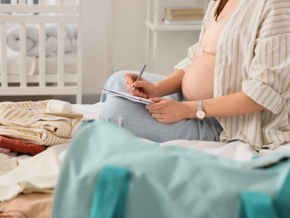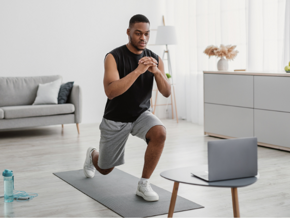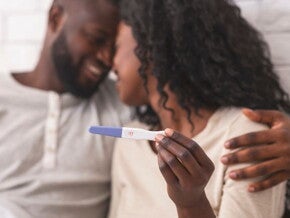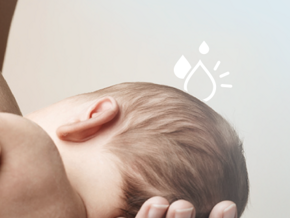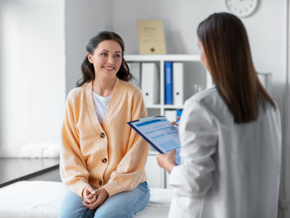
When to Take a Pregnancy Test
The best time to take a pregnancy test is around 11 days after your missed period. If you’ve returned a positive result during this time, or if you’re trying to conceive, we’ll explore what you can do next to support your pregnancy. Let’s take a look!
When is the best time to take a pregnancy test?
A regular home pregnancy test should be taken from around 11 days after your missed period. A test will show positive if the human chorionic gonadotropin (hCG) levels in your urine are high enough for this test to detect. Always follow the specific instructions on the pack for most accurate results. A common mistake is to take a home pregnancy test too soon after a missed period.
A hCG blood test from your doctor will be the most accurate in confirming pregnancy. Blood tests can also show results as early as 11–14 days after ovulation.
If you're waiting in anticipation for a positive pregnancy test, there are early response pregnancy tests available for around 6 days before your missed period.
When do early pregnancy symptoms appear?
Early pregnancy symptoms will vary between individuals, you might be lucky and have none, or unlucky and have them all! Here are some common early pregnancy signs:
- Breast changes
- Morning sickness
- Fatigue / tiredness
- Slight spotting
- Abdominal cramps
- Frequent urination
- Mood swings
- Food cravings and aversions
Once your pregnancy is confirmed, the most important thing is to get any symptom that you’re concerned about, checked out by your healthcare professional.
How do pregnancy tests work?
Pregnancy tests are designed to identify your hCG levels. hCG is a hormone made by the placenta and produced after a fertilized egg attaches to the wall of a pregnant woman's uterus. There are two types of pregnancy tests that look for hCG hormones:
Home pregnancy tests identify hCG hormone in urine – when the hCG hormone is present, it usually indicates you are pregnant, however they can show false-positive or false-negative results.
Blood test results, through your doctor, are a lot more accurate and can detect lower amounts of hCG than urine pregnancy tests.
What is the best time to take a standard home pregnancy test?
The directions on pack will advise the best time to take the home pregnancy test, however it's usually recommended to take it in the morning. As urine is more concentrated upon waking up, taking the test first thing in the morning may increase the accuracy of the test. A regular home pregnancy test should be taken from around 11 days after your missed period.
How accurate are pregnancy tests?
Home pregnancy tests offer accurate readings (up to 97%), provided you follow the manufacturer’s instructions exactly. Errors in results can be due to many reasons, including:
- Not following the manufacturer’s instructions strictly;
- Taking the test too soon after your missed period;
- Contamination of your sample e.g. using a dirty cup to collect your sample;
- Taking fluid before performing the test may dilute hCG levels
Blood tests conducted by your doctor are more accurate (about 99%) and can also detect lower levels of hCG hormone than the home pregnancy tests which means they can confirm a pregnancy earlier.
How soon will a pregnancy test read positive?
For home pregnancy tests, the instructions at the back of the pack indicates the amount of time you must wait before results show. In general, home pregnancy tests take about 3-5 minutes before it reveals the result. A blood test from your doctor will take a few days as they will need to send the sample to a pathology lab.
What is a false positive pregnancy test?
A home pregnancy test can give a false positive result so it’s always important to confirm results with your healthcare professional. A false positive result means your test shows that you are pregnant, when in fact you aren’t. Whenever you do your own test at home it’s important to follow the manufacturer's instructions exactly as this may decrease the chance of an incorrect result. A false positive can be due to several reasons, your healthcare professional will be able to investigate why your period is not appearing when it should be.
What is a false negative pregnancy test?
It’s possible that a home pregnancy test can give a false negative result. This is when your test shows you are not pregnant when in fact you are. Inaccurate results may occur for several reasons including not following the manufacturer’s instructions exactly to the letter; or taking a test too soon after your missed period. If you're uncertain about the result, or you notice your period has still not arrived, it’s always a good idea to see your healthcare professional who can conduct a blood test which is more accurate.
What should I do if I get a positive pregnancy test?
Once the home pregnancy test reflects a positive result, it's time to see your doctor to confirm your pregnancy with a blood test, schedule a prenatal check-up, and discuss your plan moving forward. Exciting times ahead!
